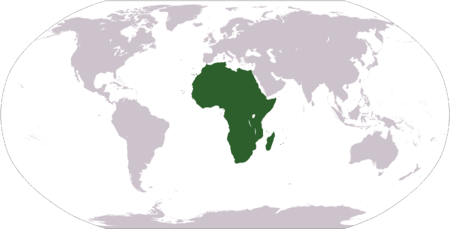Uhuru Movement
The Uhuru Movement is a radical political organization centered on the principles of Pan-Africanism, which advocates the economic and political liberation of Black Africans on both the continent of Africa and in the African diaspora, as well building economic and sustainable development in Black African and diaspora communities. Uhuru is the Swahili word for freedom.[1] Since 1972, The Movement has been led by Omali Yeshitela, the head of the African People's Socialist Party (APSP).[2]
The APSP has formed several organizations, each with specific tasks and purpose. Affiliated organizations include The International People's Democratic Uhuru Movement, African Socialist International, UhuruNews.com, African People's Solidarity Committee, Uhuru Solidarity Movement, The Black is Back Coalition, Burning Spear Productions, Uhuru Foods, Uhuru Furniture,[3] All African People's Development and Empowerment Project (AAPDEP), and African People's Education and Defense Foundation (APEDF).[4]
Political views
The movement has called for the release of all African-American prisoners in US prisons, described as "concentration camps", and has described US police forces as an "illegitimate standing army". They have called for the withdrawal of police forces from exploited and oppressed African-American communities.[5]
Area of work
The Uhuru Movement describes itself as an international organization working for economic development programs in several African communities. These programs include community gardens, rainwater-harvesting projects, community kitchens, and many more. Recently, the Uhuru Movement recently helped to build a birthing clinic in Sierra Leone.[6]
The organization came to national attention during the 2008 Presidential campaign season when Uhuru member, Diop Olugbala, interrupted Barack Obama at a town hall meeting in St. Petersburg, Florida, and questioned the candidate, asking "What about the black community?"[7] alleging that he was not speaking out for African Americans on issues such as police brutality, high unemployment, predatory lending, and Hurricane Katrina. Obama would respond to Olugbala point-by-point, highlighting his record on working to pass legislation to stop predatory lending and his condemnation of the Jena Six and the killing of Sean Bell.[8]
In June 2011, AAPDEP and INPDUM initiated the Marcus Garvey Saturday School in Washington, D.C.[9]
Controversies and criticisms
In 2004, Uhuru Movement's former leader Omali Yeshitela was embroiled in an incident in which he tore down a Halloween display in St. Petersburg that he claimed depicted a black man hanging from a noose although it later turned out to be "a synthetic spider web that spanned half the width of the gray house and an arrangement of plastic skulls and bones."[10] Subsequent opinions[11] and letters[12] to the St. Petersburg Times regarding the incident were critical of the Uhuru Movement and Yeshitela's conduct.
The Uhuru Movement was criticized by the ADL in engaging in demonstrations on January 3, 2009, in St. Petersburg, Florida, that the organization claims encouraged anti-Israel and anti-Zionist messages.[13]
In 2009, the International People's Democratic Uhuru Movement organized a march in support of Lovelle Mixon and against the Oakland police. Mixon was an Oakland, California, resident who killed four Oakland police officers and died during a shoot out after a traffic stop, coincidentally just blocks away from the local Uhuru headquarters.[14][15] On the other hand, many black Oaklanders, as well as those belonging to other racial groups, seemed largely opposed to such sentiments,[16] a clear majority of those who regularly campaign against abuses of police power also rejected any attempt to attach legitimacy to Mixon's murder rampage[17] and Caroline Mixon, a cousin of Lovelle Mixon, paid a public tribute to the Oakland police, thanking them for serving and protecting the people of Oakland.[18]
See also
- African nationalism
- Black Power
- Dead Prez, hip-hop group which advocates Pan-Africanism and other Uhuru beliefs
External links
- International People's Democratic Uhuru Movement
- Uhuru Movement
- African People's Socialist Party
- African Socialist International
References
- ↑ Standard Swahili-English Dictionary, Frederick Johnson. Oxford University Press (1951), pp. 138, 491.
- ↑ "African People's Socialist Party-USA - History". Asiuhuru.org. Retrieved 2013-01-05.
- ↑ http://sct.temple.edu/blogs/murl/2011/02/22/center-city-uhuru-furniture-offers-green-alternatives-for-unwanted-goods/
- ↑ "Uhuru Movement Dot Org :Welcome to the Uhuru Movement!". Uhurumovement.org. Retrieved 2013-01-05.
- ↑ Enhancing Police Integrity, Carl B. Klockars, Sanja Kutnjak Ivković, Maria R. Haberfeld. Springer (2006), p. 118.
- ↑ "AAPDEP-Sierra Leone U.S. Tour on Infant and Maternal Mortality raises medical supplies and cash to build clinic". Uhurunews.com. 2011-04-27. Retrieved 2013-01-05.
- ↑ "Protestor Tells Why He Heckled Obama". NPR. 2008-08-04. Retrieved 2013-01-05.
- ↑ Miller, Sunlen. "Protesters: "What About The Black Community, Obama?"". ABC News.
- ↑ Enaemaehkiw Túpac Keshena (2011-07-16). "The Marcus Garvey Saturday School Launches in Washington, D.C. « The Speed of Dreams: Since 1492". Bermudaradical.wordpress.com. Retrieved 2013-01-05.
- ↑ "Halloween display seen as symbol of hate". St. Petersburg Times. October 20, 2004.
- ↑ "Uhurus vs. Halloween display". St. Petersburg Times. October 23, 2004.
- ↑ "Uhurus went too far in destroying holiday display". St.Petersburg Times. October 23, 2004.
- ↑ "Israel's Action in Gaza Spurs Anti-Israel Rallies". ADL.
- ↑ "Dozens march for Mixon, against police", San Francisco Chronicle, March 26, 2009.
- ↑ "Calling him a 'true hero', mourners hold vigil for suspected Oakland cop killer Lovelle Mixon", New York Daily News, March 26, 2009.
- ↑ Woman says she pointed police to Oakland killer, San Francisco Chronicle, March 23, 2009.
- ↑ Kamiya, Gary (2009-03-28). "Oakland mourns". Salon.com. Retrieved 2013-01-05.
- ↑ Kuruvila, Matthai (April 1, 2009). "Killer's cousin pays tribute to Oakland cops". The San Francisco Chronicle. Archived from the original on April 4, 2009. Retrieved April 2, 2009.
| ||||||||||||||||

